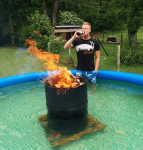- Mar 5, 2020
- 3,221
- Pool Size
- 66000
- Surface
- Plaster
- Chlorine
- Salt Water Generator
- SWG Type
- Astral Viron V35
So check my logic on this please. In the Dallas area people rely on freeze protection, including me. We have a 3 day stretch where it looks like we will dip down into the teens and get a few degrees above freezing each day. We were in the 70's earlier in the week and chances are we will be back there shortly, so I would really rather not spend superbowl sunday learning how to winterize for a 3-day stretch of weather.
I'm really only worried about a contingency plan in the absolute worst case we lose power in the middle of the night when it is in the teens. If that were to happen, this would be my course of action:
- Turn off the breakers
- Drain the filter via the bottom plug, leave the top pressure valve open as well
- Drain the pump via the bottom plug
- Tarp the equipment
Besides freezing my butt off in the middle of the night doing all of this, anyone see any glaring issues with this contingency plan?
There is one step that you might want to add to the beginning of your list (might sound trivial, but might require some planning):
Wake up...



